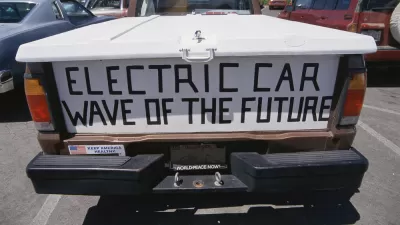For the first time since 2006, gasoline consumption in California increased from the prior fiscal year. From July 2013 through June 2014, consumption increased 1 percent.
Mark Glover of the Sacramento Bee writes that the "California Board of Equalization (BOE) characterized both gains as byproducts of an improving economy," as opposed to a decrease in gas prices, which declined 2.5 percent to an average price of $3.92 from $4.02 the previous year.
BOE’s report said that Californians consumed more than 14.57 billion gallons of gasoline in fiscal 2013-14, compared with about 14.44 billion gallons the prior year.
However, that's still well below the 2006 consumption of "nearly 16 billion gallons in 2006," writes Glover. "(D)eclining consumption has been partly due to a proliferation of hybrids and more fuel-efficient vehicles, plus generally higher gas prices."
David R. Baker of the San Francisco Chronicle adds that "state government also made cutting gasoline use part of its fight against global warming, pushing for higher mileage standards and offering rebates to drivers who buy plug-in cars."
Of course, this report does not include the rapid decline in gas prices seen since the summer. The average price of gasoline in the Golden State on Dec. 1 was $3.05, down 87 cents or 22 percent from last year's average price.
And unlike hybrid sales, which have seen a decline in sales recently, the low gas prices, combined with an improved economy are spurring light truck and SUV sales. USA Today reports that November sales of SUVs were "the best since 2001."
While it may be premature to predict this year's fuel consumption, I think it safe to say that the state is well on track to exceeding the increases made this past fiscal year. As to whether it exceeds the 2006 record—we'll await the next report from the BOE. And hopefully the California Air Resources Board will have something to report on the effect of increasing gasoline consumption on greenhouse gas emissions.
FULL STORY: BOE: Statewide gas consumption rises for first time in eight years

Planetizen Federal Action Tracker
A weekly monitor of how Trump’s orders and actions are impacting planners and planning in America.

Restaurant Patios Were a Pandemic Win — Why Were They so Hard to Keep?
Social distancing requirements and changes in travel patterns prompted cities to pilot new uses for street and sidewalk space. Then it got complicated.

Map: Where Senate Republicans Want to Sell Your Public Lands
For public land advocates, the Senate Republicans’ proposal to sell millions of acres of public land in the West is “the biggest fight of their careers.”

Maui's Vacation Rental Debate Turns Ugly
Verbal attacks, misinformation campaigns and fistfights plague a high-stakes debate to convert thousands of vacation rentals into long-term housing.

San Francisco Suspends Traffic Calming Amidst Record Deaths
Citing “a challenging fiscal landscape,” the city will cease the program on the heels of 42 traffic deaths, including 24 pedestrians.

California Homeless Arrests, Citations Spike After Ruling
An investigation reveals that anti-homeless actions increased up to 500% after Grants Pass v. Johnson — even in cities claiming no policy change.
Urban Design for Planners 1: Software Tools
This six-course series explores essential urban design concepts using open source software and equips planners with the tools they need to participate fully in the urban design process.
Planning for Universal Design
Learn the tools for implementing Universal Design in planning regulations.
Heyer Gruel & Associates PA
JM Goldson LLC
Custer County Colorado
City of Camden Redevelopment Agency
City of Astoria
Transportation Research & Education Center (TREC) at Portland State University
Camden Redevelopment Agency
City of Claremont
Municipality of Princeton (NJ)



























